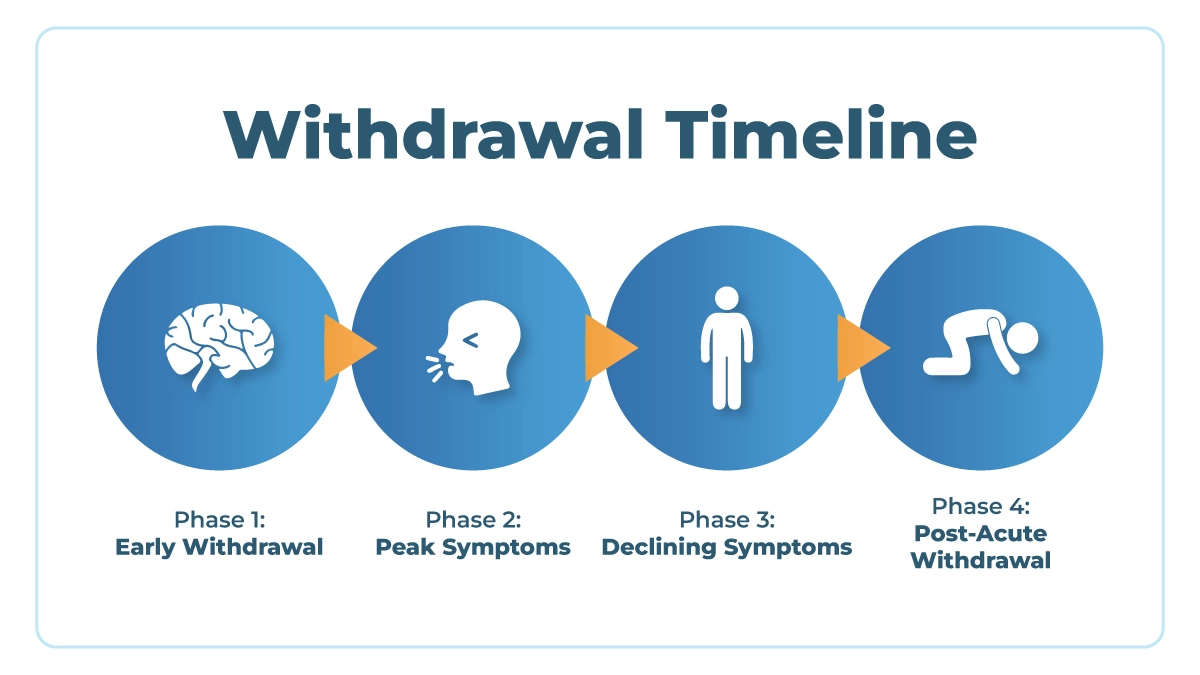Strength in Transition: Heroin Withdrawal Timeline
Heroin withdrawal is the challenging process the body undergoes when someone stops using heroin. It occurs due to the body’s dependence on the drug.
The timeline varies, with acute symptoms lasting about a week. However, post-acute withdrawal symptoms may persist, impacting mood and energy for months. Seeking professional help during this period is vital for a safer and more comfortable transition to a drug-free life.
Key Takeaways
Heroin withdrawal is the challenging process the body undergoes when someone stops using heroin. Here’s what you need to know:
- The impact of heroin extends beyond the brain, affecting various physiological functions.
- The heroin withdrawal timeline can vary from person to person but generally follows a predictable pattern.
- Complications may arise, especially in cases of severe addiction or when individuals attempt to detox without medical supervision.
- Various treatment options, including inpatient care, are available to support the recovery process.
The Recovery Team provides structured care and medical assistance to individuals seeking to overcome addiction challenges. Contact us at (800) 817-1247 to explore our services.
Understanding Heroin Addiction
Heroin, an opioid, binds to brain receptors, causing euphoria and pain relief. Regular use alters brain chemistry, leading to tolerance and dependence.
Addiction can result from seeking relief. Heroin misuse often starts with prescription opioids. Treatment involves medication and therapy. In the U.S., opioid addiction is a central public health concern.
Prevention efforts focus on education and reducing prescription misuse. Understanding the impact of heroin on both the brain and the body is vital in learning the challenges people face when trying to break free from its grip.
Effects on the Brain
Heroin exerts its effects by tying to opioid receptors in the brain, particularly those involved in pleasure and pain regulation. When heroin enters the brain, it is altered into morphine and binds to these receptors, triggering an intense feeling of euphoria. This artificial activation of the brain’s reward system creates an influential association between heroin use and pleasure.
Over time, repeated heroin use leads to changes in the brain’s structure and function. The brain adjusts to the existence of the drug, and natural neurotransmitter production is disrupted. It results in tolerance, where higher doses are needed to achieve the same effect, and dependence, where the body requires heroin to function normally. The cycle of addiction is perpetuated as individuals chase the initial euphoria, often at the expense of their physical and mental well-being.
How It Works on the Body
The impact of heroin extends beyond the brain, affecting various physiological functions. The medicine depresses the central nervous system (CNS), slowing breathing and heart rates.
Chronic heroin use can contribute to respiratory issues, cardiovascular problems, and compromised immune function. Injection drug use, a standard method of heroin consumption, also introduces the risk of infectious illnesses like HIV and hepatitis via the sharing of needles.
Heroin Detox
Heroin detox helps individuals overcome addiction. It’s a process where the body eliminates heroin. Symptoms, like nausea and anxiety, may arise but are temporary. Medical supervision ensures safety. Medications ease discomfort. Methadone and buprenorphine manage cravings.
Detox is a vital first step, but recovery involves counseling and support. Seek professional help for a tailored plan. The United States offers detox options, from inpatient to outpatient programs. Recovery is possible with commitment and the proper assistance.
Withdrawal Timeline
The heroin withdrawal timeline is a structured progression of symptoms that individuals may experience during detox. This timeline can vary from person to person but generally follows a predictable pattern.
Phase 1: Early Withdrawal
The early withdrawal phase typically begins within 6-12 hours after the last heroin dose. During this phase, individuals may experience anxiety, restlessness, muscle aches, and increased tearing. These heroin withdrawal symptoms reflect the body’s initial reaction to the absence of heroin and the reawakening of natural neurotransmitter functions.
Phase 2: Peak Symptoms
The withdrawal symptoms peak between 24 and 48 hours after the last dose. This phase is the most challenging as symptoms intensify. Individuals may endure nausea, vomiting, diarrhea, chills, sweating, and abdominal cramps. The overwhelming craving for heroin can be a significant obstacle during this stage, requiring substantial emotional and psychological resilience.
Phase 3: Declining Symptoms
Following the peak symptoms, the intensity of withdrawal gradually decreases. By the end of the first week, many physical symptoms begin to subside.
However, psychological symptoms such as anxiety, insomnia, and mood swings may persist. The body continues to readjust to functioning without heroin, and the individual enters a stabilizing phase.
Phase 4: Post-Acute Withdrawal Syndrome
Some individuals may experience a more prolonged phase known as post-acute withdrawal syndrome (PAWS). PAWS can persist for months and is characterized by intermittent waves of withdrawal symptoms, including mood swings, anxiety, and fatigue. This phase highlights the importance of ongoing support and treatment to navigate the challenges of early recovery.
Factors Influencing the Withdrawal Timeline
Several factors impact the duration and intensity of heroin withdrawal. The amount and frequency of heroin use play a role, with heavier use often leading to more prolonged withdrawal.
Individual metabolism and overall health also influence the withdrawal experience. Co-occurring mental health conditions can complicate the process. The method of heroin consumption matters, as injection may result in a quicker onset of withdrawal symptoms.
Seeking medical assistance, such as in a heroin detox center, can help manage withdrawal and shorten the overall timeline. These factors highlight the need for personalized and professional guidance during the withdrawal phase.
Complications of Heroin Withdrawal
While heroin withdrawal is generally not life-threatening, it can be extremely uncomfortable and challenging. Complications may arise, especially in cases of severe addiction or when individuals attempt to detox without medical supervision.
Dehydration, electrolyte imbalances, and complications related to pre-existing health conditions can occur. It highlights the essence of seeking professional help during the detox process to ensure a safer and more comfortable transition against substances.
Managing Heroin Withdrawal
In the critical days following the last use of heroin, seeking medical assistance is required for a safer withdrawal process. Medical professionals often recommend medical detox, especially for those experiencing severe symptoms of heroin withdrawal. It involves the use of short-acting opioids or medications like Methadone to manage the physical dependence on heroin.
Medication-Assisted Treatment
Medication-assisted treatment (MAT) is a comprehensive procedure to address opioid use disorder. It combines medications with therapy and counseling to support long-term recovery. These evidence-based treatment plans help manage cravings and reduce the severity of withdrawal symptoms.
Therapy and Counseling
Therapy and counseling play pivotal roles in addressing the psychological aspects of heroin withdrawal. Patients may experience anxiety, panic attacks, and cravings during this challenging period. Therapy sessions provide essential tools to cope with these challenges, fostering emotional well-being.
Residential Treatment After Detox
After completing detox at a heroin detox center, individuals with heroin use disorder often consider residential treatment programs. Inpatient treatment centers like The Recovery Team offer a structured way to address drug addiction, providing medical support during uncomfortable withdrawal symptoms. This approach minimizes the fear of withdrawal and addresses potential health problems associated with regular heroin use.
In the United States, various treatment options, including inpatient care, are available to support the recovery process. Proper nutrition and hydration are key elements of managing heroin withdrawal. In addition to information, maintain a proportional diet and stay hydrated to support the body’s healing process, contributing to overall well-being.
Experience Transformation With The Recovery Team
The Recovery Team is an accredited facility meticulously designed for your triumph over addiction challenges.
Immerse yourself in a residential program where care, counseling, and a structured routine foster the foundation for lasting recovery. Transition through our comprehensive services, ensuring a smooth and supported reintegration.
Where a dual diagnosis program addresses both addiction and underlying mental health issues simultaneously. Experience one-on-one counseling sessions in individual therapy, empowering you to understand triggers, develop coping mechanisms, and build resilience against relapse.
It is time to light the way forward to a life of resilience and fulfillment. Contact (800) 817-1247 to begin your personalized journey to sobriety.






